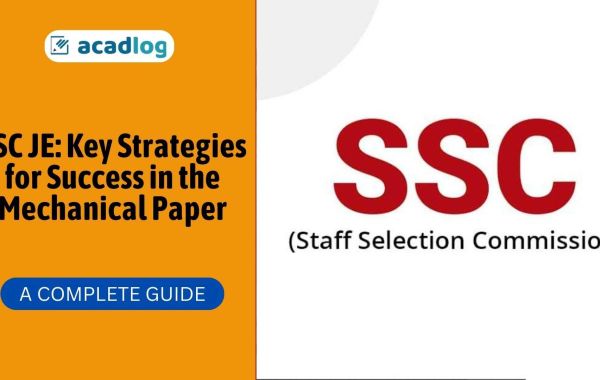The Staff Selection Commission Junior Engineer (SSC JE) examination is a critical step for engineers aspiring to work in various government departments in India. This article specifically addresses the Mechanical Engineering paper, offering key strategies and insights to help candidates excel in this competitive exam.
Understanding the SSC JE Mechanical Paper
The SSC JE Mechanical exam is designed to assess the technical knowledge and practical application skills of candidates in the field of mechanical engineering. It covers a wide range of topics, including thermodynamics, fluid mechanics, and machine design.
Exam Pattern and Syllabus
Exam Pattern
The SSC JE exam consists of two papers:
- Paper-I: Objective type questions covering General Intelligence Reasoning, General Awareness, and General Engineering (Mechanical).
- Paper-II: Descriptive type questions focusing exclusively on Mechanical Engineering.
Syllabus Overview
The Mechanical Engineering section includes topics like:
- Theory of Machines and Machine Design
- Engineering Mechanics and Strength of Materials
- Thermal Engineering
- Fluid Mechanics Machinery
- Production Engineering
Key Strategies for Preparation
In-Depth Understanding of Concepts
- Focus on understanding fundamental concepts in each topic.
- Use standard textbooks and reference materials for clarity.
Regular Practice and Problem-Solving
- Solve a variety of problems to strengthen your application skills.
- Practice previous years' question papers and sample papers.
Time Management
- Develop a study schedule that allocates ample time for each topic.
- Practice time management skills by timing your problem-solving sessions.
Use of Diagrams and Illustrations
- Utilize diagrams and illustrations to better understand complex topics.
- In the descriptive paper, use sketches and drawings to enhance your answers.
Revision and Mock Tests
- Regularly revise topics to reinforce your memory.
- Take mock tests to familiarize yourself with the exam pattern and to improve speed and accuracy.
Recommended Study Resources
- Textbooks: Refer to standard textbooks like "Engineering Mechanics" by R.S. Khurmi and "Thermodynamics" by P.K. Nag.
- Online Resources: Utilize online platforms for additional study materials and video tutorials.
- Coaching Institutes: Consider joining a coaching institute if you require structured guidance.
Challenges and Solutions
Keeping Up with the Vast Syllabus
- Challenge: The syllabus for mechanical engineering is extensive.
- Solution: Prioritize topics based on weightage and your strengths.
Application of Theoretical Knowledge
- Challenge: Applying theoretical knowledge to solve practical problems.
- Solution: Practice application-based questions and understand the practical implications of theories.
Time Management in the Exam
- Challenge: Managing time effectively during the exam.
- Solution: Practice solving questions within a set time limit and develop a strategy for time allocation for each section.
Career Growth and Opportunities
Clearing the SSC JE exam opens up opportunities for mechanical engineers in various government sectors. Career growth involves promotions to senior engineering positions, project management roles, and opportunities for further specialization.
Final Words
Success in the SSC JE Mechanical paper requires a blend of strong theoretical understanding, practical application skills, and strategic exam preparation. By focusing on the key areas of the syllabus, practicing diligently, and utilizing the right resources, candidates can significantly enhance their chances of securing a position as a Junior Engineer in the government sector. This not only offers a stable and prestigious career but also the opportunity to contribute to the nation's development.
Read more on Acadlog and Acadlog.in








